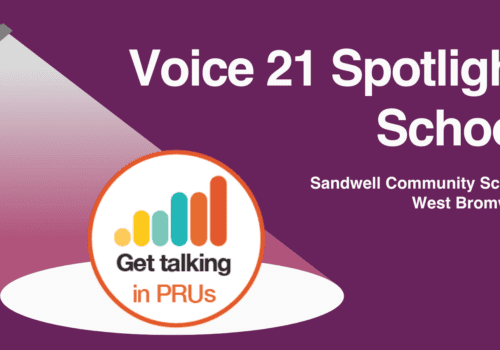What motivated you to introduce oracy into your classroom/school?
In early 2018, we took part in a peer review process with leaders from other primary schools on the Isle of Dogs. The feedback that we received focused heavily on the passivity of our children. There was evidently not enough purposeful talk in our classrooms. As a leadership team, we spent time looking into the current research and came across the idea of oracy and the work being done at Hughes Hall in Cambridge. This symbolised really a lightbulb moment for us.
Despite leaving our school with above national average reading, writing and maths, we could not say the same about our pupils’ spoken communication skills. We felt that this was the missing link in our curriculum and therefore sought out Voice 21 to assist us in creating an oracy-based approach to learning and teaching at Cubitt Town.
I am also particularly taken by the moral case for teaching oracy. I see education as the most powerful tool for social mobility, and equipping children from less advantaged backgrounds with the spoken language skills that will enable them to succeed in education and the workplace seems like a vital endeavour.
How have you embedded oracy into your teaching practice and across your school?
As oracy was going to be the driver of our curriculum, we decided that we wanted this to be reflected in a whole school approach. As such, we devoted two inset days as well as numerous staff meetings to exploring approaches to teaching oracy. These included support staff and midday meals supervisors, who had additional training on the language of conflict resolution.
Working closely with Voice 21, we developed a comprehensive approach to teaching oracy. All lessons are now expected to include an oracy outcome. We aim to teach oracy skills in both stand-alone lessons and embedded within learning across the curriculum.
All classrooms reflect this, with ‘discussion guidelines’ created with the children to model the expectations of talk (agreeing and disagreeing politely, taking turns, building and challenging others’ ideas etc.) Talk is scaffolded much in the same way we scaffold in reading and writing, to ensure that all children can access the learning. We have oracy displays throughout the school and celebrate excellence in termly showcase events, from poetry slams to persuasive speaking competitions.
Finally, out assemblies are now also conducted in a dialogic manner in circles. All children are expected to talk, in pairs, trios and to the whole group. As such, they have an oracy outcome in addition to the learning linked to the assembly theme/stimulus.
What impact has this had on your students?
By raising the profile and presence of oracy, staff and children began talking about it in the same way they do about literacy and maths. A collective consciousness about the importance of talk has taken root. Oracy now sits alongside literacy and numeracy as an equal partner in our curriculum.
One only needs to wander through classrooms or observe an assembly to witness the impact that our oracy-based curriculum is having. Our children are talking more, and with more purpose. Furthermore a pupil-voice survey points to an upturn in our children’s confidence in speaking to partners, in front of the class and in assemblies. The impact of our dialogic assemblies has been particularly felt, with 25% of the children saying at the beginning of the year that they felt ‘not at all confident’ in sharing their ideas, reducing to below 5% answering the same at the end of the year.
This mirrors the feedback we have received from external visitors, including Ofsted, who have also commented on how effectively our children are now talking in class. Comments from a visiting University tutor from the Institute of Education capture this:
“When I observed a group of Year Six children, I was impressed by their ability to express themselves and to articulate their ideas. One child was asked to explain his method of problem solving and did so with a very real appreciation of how his words would be perceived by others. The children’s peer-to-peer discussion and explanations were effective and clear; and my overall impression is that your school’s focus on oracy is having a positive impact on learning and self-esteem.”
What has been your experience of working with Voice 21?
Last year I completed the Voice 21 Pioneers Programme and this year have moved onto the Oracy Leaders Programme. The training has been consistently excellent and has given me the tools and confidence to lead oracy across my school. We also worked with Voice 21 for a full academic year at school, and they tailored their input and training to our specific needs. Again, all of this was well planned, thorough and helpful.
This year, we have created the Tower Hamlets Oracy Hub, with over 20 schools working together across the borough to collaborate and share best practice relating to oracy. Voice 21 are providing the training and have again been really flexible, helping to create a bespoke programme for our participants.
What advice would you give to other schools who are prioritising oracy for the first time?
I would strongly suggest looking firstly at the wealth of research, including accessible literature on classroom practice. I would wholeheartedly advise working with Voice 21 as closely as possible as you look to prioritise oracy, as they have a wealth of knowledge and expertise. I think the reason that we have managed to be so successful at Cubitt Town, is that we have adopted a whole school approach to oracy. As such, it feels like a culture shift, in which everyone is involved, which has provided really fertile environment for success.

